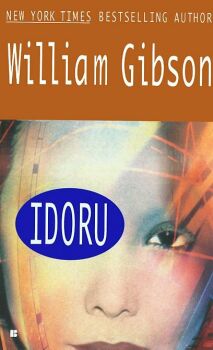
Pioneering an entire genre of science fiction isn't necessarily a good thing. William Gibson burst onto the scene in 1984 with the Hugo and Nebula award-winning Neuromancer, ushering in a new breed of sci-fi known as cyberpunk. Simply put, that novel was brilliant, and left Gibson with the unenviable task of having to live up to it with his subsequent work. While his success at this has been debateable, it would be unfair to say that he hasn't written some good books in the process. His latest effort, Idoru, is a solid piece of science fiction set only a few years in the future, revolving about a rock star and his intention to, essentially, marry a hologram.
The story has two main characters set on entirely different paths. The first, Colin Laney, is a data analyst with a unique ability to detect patterns in massive volumes of information, which allows him to unearth unknown or even hidden facts about his subjects. These talents had been put to work by the future equivalent of tabloid television, digging for dirt on celebrities, until Laney was implicated in the death of a young woman involved with one of his targets. This story is told in retrospect by Laney to his new employers, a huge Australian bodyguard and a Japanese man who work for a legendary rock band called Lo/Rez. His job is to find out what is behind Rei Toei, a holographic singer that one of the leaders of the band, Rez, intends to marry.
The second thread of the story is about a young fan of Lo/Rez named Chia Pet Mackenzie, who is charged by her local chapter of the band's fan club to fly to Tokyo and figure out if the rumours of Rez's intentions to marry a software agent are true. After a strange encounter on the flight to Japan and a stonewalling by the local Japanese chapter of the fan club once she arrives, Chia is thrown into a tangled web of computer hackers and seedy underworld types. Her inquiries about Lo/Rez pique some interest, dragging the mess she's gotten herself into over to Laney and his employers.
Gibson does an admirable job of telling two almost entirely separate stories, and then weaving them together. It's subtle at first, but over time, the paths of Laney and Chia seem as destined for each other as Rez and Rei Toei. The characters are well-written, with a myriad of different appearances and motivations all converging on Tokyo and the paradox of a man marrying a hologram. His description of Laney's ability to catch 'nodal points' in huge quantities of data is fascinating, and Laney's story reflects the sort of burned-out reluctant hero that fans have come to expect from Gibson.
It's also an interesting exercise to judge Gibson's prognostication about the near future. There is already a virtual pop star in Japan. Fans of musical groups bond with one another across geographical boundaries on the Internet. Companies employ data mining to find complex relationships in vast data warehouses. Computers are beginning to transcend the simple rectangular design. While some of these efforts may have been underway while the book was being written, it's almost uncanny how on the mark Gibson is about the world to come. Good cyberpunk thrives on the possibility that the world as described could exist, and Idoru does well in that regard. While it might not be as groundbreaking as Neuromancer, William Gibson is still working adroitly within the model he pioneered, showing why he is an important figure in science fiction.
in this section:
search
recent entries in REVIEWS
August 14, 2008
Lollapalooza 2008 Day 2 (8/2/2008)
August 14, 2008
Lollapalooza 2008 Day 1 (8/1/2008)
August 14, 2008
Lollapalooza Day 3 (8/5/2007)
August 14, 2007
Lollapalooza Day 2 (8/4/2007)
August 7, 2007
archives by month
3 posts
August 2007
3 posts
September 2005
1 posts
August 2005
1 posts
February 2005
1 posts
February 2004
2 posts
COMPLETE MONTHLY ARCHIVES